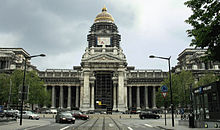Court of Cassation (Belgium)
| Court of Cassation | |
|---|---|
| Hof van Cassatie (in Dutch) Cour de Cassation (in French) Kassationshof (in German) | |
 The Brussels Palace of Justice is the seat of the Court of Cassation | |
| Location | Palace of Justice, Brussels |
| Coordinates | 50°50′12″N 4°21′06″E / 50.83667°N 4.35167°E |
| Authorized by | Constitution of Belgium Judicial Code |
| Judge term length | Life tenure |
| Website | justitie.belgium.be |
| First President of the Court of Cassation | |
| Currently | Ridder Jean De Codt |
| Since | 2014 |
| Lead position ends | 2019 |
This article does not cite any sources. (July 2011) (Learn how and when to remove this template message) |

The Court of Cassation (Dutch: Hof van Cassatie, French: Cour de cassation, German: Kassationshof) is the main court of last resort or supreme court in Belgium.
It was originally modelled after the French Cour de cassation. Its jurisdiction and powers are similar to those of its French counterpart.
To maintain readability: Dutch terms will be abbreviated as D, French terms as F.
Organisation[edit]
The court comprises three chambers with 16 judges. Each chamber in turn has a Dutch and a French division. Each chamber has a chief judge, called the President, and two heads of division, one for each language group. The entire court is headed by a chief judge called the First President.
The parket generaal (D) or parquet général (F) is headed by the Chief Prosecutor (D: procureur-generaal, F: procureur général). The Prosecutor is a magistrate, but does not actually try cases (his role is to give legal advice to the Court, in a similar manner to the Commissioner of the Government of Council of State (D: Raad van State, F: Conseil d'État). He brings cases to the Court "in the name of the law." The Chief Prosecutor is aided by the First Prosecutor (first advocat-general) and about 12 Prosecutors (D: advocaten-generaal, F: avocats généraux).
Bar[edit]
The lawyers, while not employees of the Court and not technically part of it, play an important role in the correct application of justice.
With the exception of a few categories of litigation (namely in penal cases), it is compulsory to use an advocate when referring matters to the Court of Cassation. Lawyers admitted to pleading before this high court are known as advocaat bij het Hof van Cassatie (D) or avocat à la Cour de Cassation (F). The roles of these specialized lawyers includes advising litigants on whether their pleas are admissible, particularly that cassation cases only review points of law and not points of fact.
Jurisdiction[edit]
- Appeal to the Court of Cassation is only possible against judgements against which no ordinary appeal is possible anymore. This will happen when all normal appeal procedures have been followed, usually before the courts of appeal or the Courts of Labour. The Court of Cassation can only confirm these judgements, or annul them ("cassation", from the French "casser", to break). It can not examine the case and make a new judgement. The court can annul the entire judgement, or just part of it (D: gedeeltelijke cassatie, F: cassation partielle). If the court annuls a judgement, the case is remitted to a court at the same level as the one which judgement was overturned. The decision of the Court of Cassation is not (yet) binding, however (article 6 of the Judiciary Code [D Gerechtelijk Wetboek / F Code judiciaire]). Until 2017, the new court could decide the case as it pleased (but the decision of the Court of Cassation had a persuasive value). The decision of the new court could again be appealed to the Court of Cassation. In this case, if the earlier decision of the Court of Cassation is confirmed, the case was brought before a third court at the same level as the one which judgement was overturned, but this time the decision of the Court of Cassation was binding on points of law. Since 6 July 2017, the first decision of the Court is binding too.
- In some cases, it is unclear whether a case should be heard before administrative courts or judiciary courts. In these conflicts of attribution, the Court of Cassation can be asked to decide who has jurisdiction.[citation needed]
- Occasionally the Court of Cassation requests the opinion of the European Court of Justice with respect to the laws of the European Union or of the Constitutional Court of Belgium with respect to issues of the constitutionality of laws.
- The Court of Cassation also acts as venue of appeal for jurisdictional judgements of the Court of Audit of Belgium. The Court of Audit decides by administrative ruling whether the accounts of accounting officers answerable to the Treasury are in balance, whether the balance is in their favour or in the State's favour. If the ruling shows a deficit the officer after a public procedure the Court of Audit either exonerates the accounting officer or condemns him to make good that amount or part of it. The ruling can be appealed to the Court of Cassation. If the judgement is vacated, the case is referred to an appropriate "ad hoc" committee, made up of members of the Belgian Chamber of Representatives who judge the case without the possibility of any subsequent appeal.
See also[edit]
- List of Belgian Judges
- Court of cassation
- Council of State (Belgium)
- Constitutional Court of Belgium
No comments:
Post a Comment